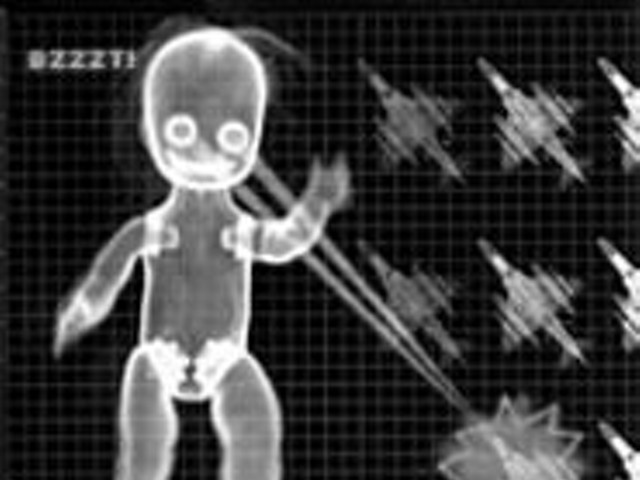The answers to these questions, in reverse order, are as follows: Rock & roll is very real when Iggy Pop is doing the rocking; Beat 'Em Up is glorious proof. Iggy Pop is as real as any persona can be. Pop is the mask that Jim Osterberg wears while dispensing the truth. And finally: Yes, Virginia, Jim Osterberg can transcend the horrors of Iggy Pop and dispense the same truth of life as Dmitri Karamazov because Iggy is as truthful as his fictional progenitor. "For though I'm a man of base desires, I'm honest," Dmitri tells his brother Alyosha. Iggy Pop makes the same claim, and his body of work is his evidence. "A fine little girl is waiting for me/But I'm as bent as Dostoevsky/I think about the meaning of my life again/and I have to sing 'Louie Louie' again," Iggy cackles in his version of Richard Berry's garage-rock godmaker (on 1993's American Caesar), and in that instant he slips on Dmitri's mantle, claiming his limitations and his possibilities.
The difference between the two men is language. Dmitri is prone to grand proclamations and declamations of intention; Iggy's language hews to the bone, slashing away at civility until intention is laid bare. Dmitri frets at what lurks in his heart; Iggy accepts his heart's inner workings as his own true self. "What to the mind is shameful is beauty and nothing else to the heart. Is there beauty in Sodom? Believe me, that for the immense mass of mankind beauty is found in Sodom. Did you know that secret? The awful thing is that beauty is mysterious as well as terrible. God and the devil are fighting there, and the battlefield is the heart of man," Dmitri tells Iggy. Iggy, who knows a thing or two about the delights of Sodom, tells Dmitri to shake it off: "So many people are scared of their hearts. You don't have to be scared of your heart. You just have to find a new road." (The preceding quotation is taken from Iggy's oral biography, transcribed by Anne Wehrer, I Need More.) Dmitri is persistent, though, and reminds Iggy, "Beauty is a terrible and awful thing! It is terrible because it has not been defined and is undefinable ..."
That nebulous space between the defined and the undefinable is what has always powered Iggy Pop, from the coruscating nihilism of his Stooges days to the grim introspection of 1999's Avenue B. Beauty in all its horrible possibilities, beauty in wealth, beauty in paucity, beauty as want and surfeit, beauty as emptiness and beauty as throat-choking fullness. "I'm into beauty, beauty and luxury," Iggy says in I Need More. And so Iggy throws himself headlong into its terribleness and awfulness, always looking for that new road that leads to the heart's acceptance. If God and the devil are truly waging war in the heart of man, Iggy Pop is an active combatant, capable of great atrocities and greater heroism. To his credit, he records his failures as well as his successes.
Beat 'Em Up is the latest dispatch from the front line of Iggy's heart, and it is an indictment of the corporatization of Beauty. Backed by the Kirst Brothers and Mooseman (formerly of Ice-T's Body Count), Iggy gives full throat to the acetylene-torch fury of his heart, attacking the homogenized marketing plan of America Inc. The brothers Kirst, Whitey (guitars) and Alex (drums), are the third great fraternal tandem in Iggy's illustrious career, and they evoke all the rough edges of the Asheton Stooges and the slick power of the Sales brothers on Lust for Life. Over Alex's hands-of-stone drums and Whitey's stinging guitar flares, Iggy howls, "Listen Little Man/Advertise this/It's all shit/It's all shit/None of it's shit/You are dim/Love just keeps on comin'/Love will clean it up," on "It's All Shit." During the relentless stomp of "Mask," Iggy calls out the intellectuals, the critics and kingmakers with venomous scorn -- "Irony in place of balls/balls in place of brains/brains in place of soul/Where is the Soul?/Where is the Love?" -- while his band corkscrews itself into the monotonous riff of genius rock & roll. Iggy knows beauty can be found in the writhing guts of monstrous bass and drum-lock grooves and holocaust-level guitar distortion, so he ends his album with the live-in-the-studio smash-up of "Sterility." "I'm sorry, but, ah, sterility, sterility, sterility bores me. Sterility turns me off," Iggy once proclaimed, and so this last hidden track wallows in the steaming fecundity of Iggy's heart. Whitey Kirst's fingers blur into bloody shreds as he cranks out the sound of a heart that wants more than sanitization, sameness, compliance and unthinking acceptance can offer. "C'mon, Whitey! Is that the best you can do?" Iggy screams at his guitarist, smashing his mouth shut over and over on the cold, bland foulness of the word "Sterility! Sterility! Sterility! Sterility!," transforming it into a shout of defiance. Once again, for the thousandth time, Iggy Pop forges anew the soul of James Osterberg and Dmitri Karamazov, the whole of a race who want more, who want beauty and truth. "It is not Beauty which will save, it itself must be saved," wrote Konstantin Mochulsky. Iggy Pop has dedicated himself to saving beauty, regardless of how ugly he must make himself in the process.





